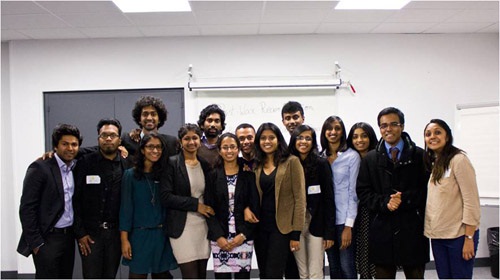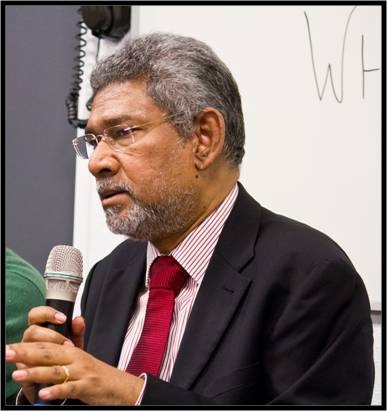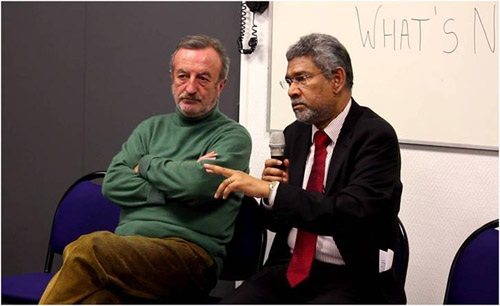“What it is to be Sri Lankanâ€ÂÂÂ: Ambassador Dayan Jayatilleka
Posted on January 2nd, 2013
Media Release-ƒÆ’-¡ƒ”š‚ Embassy of Sri Lanka Paris
Ambassador Dayan Jayatilleka participated as a special guest at a French-Sri Lankan Diaspora youth workshop on ƒÆ’‚¢ƒ¢-¡‚¬ƒ…-Post-War Reconciliation Dialogue for a Sustainable PeaceƒÆ’‚¢ƒ¢-¡‚¬ƒ”š‚ in late October 2012, organized by WhatƒÆ’‚¢ƒ¢-¡‚¬ƒ¢-¾‚¢s Next!, an independent forum initiated in February 2012. Also present on this occasion were Ambassador Michel Lummaux, former Ambassador of France to Sri Lanka and Madam Sanja Jayatilleka.
ƒÆ’-¡ƒ”š‚ Delivering their closing remarks, both Ambassador Jayatilleka and Ambassador Lummaux highlighted the importance of events and initiatives of this nature.
ƒÆ’-¡ƒ”š‚ Referring to French philosopher, Jacques Lacan, Dr. Jayatilleka shared what meant according to him to be Sri Lankan: ƒÆ’‚¢ƒ¢-¡‚¬ƒ…-Sri Lanka to me, is, in the Lacanian sense, the place.ƒÆ’‚¢ƒ¢-¡‚¬ƒ”š‚
ƒÆ’-¡ƒ”š‚ Addressing the audience of second generation French-Sri Lankans, he observed that: ƒÆ’‚¢ƒ¢-¡‚¬ƒ…-the transition to a stable sustainable peace is not possible without a transformation in Sri Lanka and of Sri LankaƒÆ’‚¢ƒ¢-¡‚¬ƒ¢-¾‚¢s relationship with the world. [ƒÆ’‚¢ƒ¢-¡‚¬ƒ”š‚¦] you can also help Sri Lanka negotiate its relationships within and with the rest of the world, which is something we have not always been very good at. [ƒÆ’‚¢ƒ¢-¡‚¬ƒ”š‚¦] May be it is about finding a way to live with mutual respect in that place that we call Sri Lanka.ƒÆ’‚¢ƒ¢-¡‚¬ƒ”š‚
ƒÆ’-¡ƒ”š‚ Initiated with the support of Ambassador Jayatilleka, WhatƒÆ’‚¢ƒ¢-¡‚¬ƒ¢-¾‚¢s Next! comprises of post-graduates and young professionals of Sri Lankan origin residing in France. It seeks to promote a sustainable peace in Sri Lanka through intellectual exchange and multicultural dialogue.
ƒÆ’-¡ƒ”š‚ [Please find below full speech of Ambassador JayatillekaƒÆ’‚¢ƒ¢-¡‚¬ƒ¢-¾‚¢s]
Ambassador Dayan Jayatilleka with H.E. Michel Lummaux (former Ambassador of France to Sri Lanka)
ƒÆ’-¡ƒ”š‚ What It Is To Be Sri Lankan:
Full transcript of H.E. Dr. Dayan JayatillekaƒÆ’‚¢ƒ¢-¡‚¬ƒ¢-¾‚¢s closing remarks at French-Sri Lankan Diaspora Youth Workshop
Paris, October 27th, 2012
ƒÆ’-¡ƒ”š‚ If I were to sum up my own understanding of the problematic within which the discussion took place, it is that of the dual role of transition-transformation or transition/transformation of Sri Lanka; the transition to a stable sustainable peace which is not possible without a transformation in Sri Lanka and of Sri LankaƒÆ’‚¢ƒ¢-¡‚¬ƒ¢-¾‚¢s relationship with the world. Which brings us to another point which I hope will be helpful because this is my own way of understanding what it is to be Sri Lankan.
ƒÆ’-¡ƒ”š‚ I was reading one of Jacques LacanƒÆ’‚¢ƒ¢-¡‚¬ƒ¢-¾‚¢s last lectures, of course in English translation, in which he summarizes his teaching. And in a deliberate departure, an ironic departure from the Biblical sentence that ƒÆ’‚¢ƒ¢-¡‚¬ƒ…-In the beginning was the worldƒÆ’‚¢ƒ¢-¡‚¬ƒ”š‚, Lacan says ƒÆ’‚¢ƒ¢-¡‚¬ƒ…-In the beginning was the placeƒÆ’‚¢ƒ¢-¡‚¬ƒ”š‚.
ƒÆ’-¡ƒ”š‚ Now, if you look at Sri Lanka as a place, then perhaps you would understand differently what it is to be Sri Lankan. So the crux of the issue is not ƒÆ’‚¢ƒ¢-¡‚¬ƒ…-are you Sinhalese, Tamil, Muslim, or BurgherƒÆ’‚¢ƒ¢-¡‚¬ƒ”š‚, but I consider myself Sri Lankan in the sense that I am from that place or it is one of the places that I am coming from. So it is in the sense of ƒÆ’‚¢ƒ¢-¡‚¬ƒ”¹…”the island called Sri LankaƒÆ’‚¢ƒ¢-¡‚¬ƒ¢-¾‚¢. And I refuse to have it defined in a different way personally. Sri Lanka to me is, in the Lacanian sense, the place.
ƒÆ’-¡ƒ”š‚ If we take the famous piece of literature, the myth or the legend of RƒÆ’-¾ƒ”š‚mƒÆ’-¾ƒ”š‚yaƒÆ’‚¡ƒ”š‚¹ƒ¢¢”š¬‚¡a, Ravana is identified as being from ƒÆ’‚¢ƒ¢-¡‚¬ƒ”¹…”LankaƒÆ’‚¢ƒ¢-¡‚¬ƒ¢-¾‚¢. He is not Sinhalese, he is not Tamil; he is from Lanka. Ravana in that sense was the first Lankan. I do not know about the Sri part of it.
ƒÆ’-¡ƒ”š‚ Now there is another, perhaps dominant perspective, not only among the Sinhalese but also the Tamils; not only of the Tamils but also the Sinhalese: a reassertion of narrower, more primordial identities, separated from each other, hierarchized, sharpened, made militant. That is another vision.
ƒÆ’-¡ƒ”š‚ The fact that you, the Diaspora youth, are ƒÆ’‚¢ƒ¢-¡‚¬ƒ”¹…”in-betweenƒÆ’‚¢ƒ¢-¡‚¬ƒ¢-¾‚¢ does not mean that you have to consider yourself left out, though some may try to leave you out. Because being in-between you have had to negotiate the different component of your identities: Sinhala and Tamil, Sinhala and Burgher, Sri Lankan and French. You have had to live in a mode of negotiation. But this is surely what we have to do in Sri Lanka? Because, what is negotiation about? Negotiation is about relationships, just as relationships are about negotiation. Certainly from the French intellectual tradition of structuralism we understand that what are important are not the entities in and of themselves but precisely the relationships–and the inter-relationships. And you have been negotiating the relationships within yourself but also between yourself and others, and you have understood that theyƒÆ’‚¢ƒ¢-¡‚¬ƒ¢¢”š¬‚the relationships– themselves change and perceptions of them change.
ƒÆ’-¡ƒ”š‚ So this is what we in Sri Lanka have to do and where you too can play a part because you can also help Sri Lanka negotiate its relationships within, and with the rest of the world, which is something we have not always been very good at. Sri Lankans have been good at surviving but not so good at mediation; at mediating the relationships. And you can help them understand; help us understand, what it means to mediate. Mediation perhaps ideally, may lead to some kind of synthesis, but perhaps that is not necessary. May be it is about finding a way to live with mutual respect in that place that we call Sri Lanka. It does not necessarily have to be the only home we have, it is not the only home, you have but it is also one of your homes. You can have many or your home can consist of many spaces; many places. These are all things that we have to process.
ƒÆ’-¡ƒ”š‚ I would also comment on the very important discussion on Sri Lanka and Buddhism. My submission is that the problem is not whether Buddhist is a philosophy or a religion, or whether it is a philosophy that has been distorted into a religionƒÆ’‚¢ƒ¢-¡‚¬ƒ¢¢”š¬‚which has been debated here. I do not think that that is the problem. The problem is not with Buddhism. Those of you, those of us, who value Buddhism as a religion, a philosophy, a way of life, you can help in reminding, restoring and recalling the universality of Buddhism. I am not a Buddhist, but Buddhism contains one of the most Universalist messages I have known: ƒÆ’‚¢ƒ¢-¡‚¬ƒ…-May all living beings be happyƒÆ’‚¢ƒ¢-¡‚¬ƒ”š‚. I cannot think of anything more Universalist because it embraces non-human living beings as well. Now unfortunately, the universality has been devalued and replaced with this extreme narrowing, identification and over-attachment which goes contrary to the spirit of Buddhism, with a single ethnic identity. That is the problem.
ƒÆ’-¡ƒ”š‚ So these are some of the many ideas that came up or were implicit in your discussion, and I hope you take the debate to the next level. I will conclude with two interlinked themes which again derive from the French intellectual tradition and the French historical tradition. One is the assertion of, most famously Sartre, that ƒÆ’‚¢ƒ¢-¡‚¬ƒ…-Existence precedes essenceƒÆ’‚¢ƒ¢-¡‚¬ƒ”š‚. Because what we have been discussing really is the problem of being reduced to an essence. Are you a Sinhalese or are you a Tamil? Whether you are Sinhalese or Tamil, or on the contrary you are French– that is supposed to prescribe your destiny. That is ƒÆ’‚¢ƒ¢-¡‚¬ƒ”¹…”essentialistƒÆ’‚¢ƒ¢-¡‚¬ƒ¢-¾‚¢. You are reduced to some origin and that is supposed to be your destiny, but it is not. As Sartre reminded us, existence, what we make of ourselves, precedes essence, is more important than essence. Of course, this does not take place at a vacuum. And here we have here another French debate of situationism because you have to understand the situation in order to change the situation. You have very rich resources in the French intellectual tradition, tools to be able to understand and participate in this transition-transformation.
ƒÆ’-¡ƒ”š‚ Never forget that for the eventual victory or assertion of reason, there was a very important ideological struggle, the struggle against irrational ideas, traditional hierarchies which were made sacred simply because this is the way things have always existed. So the role of the Encyclopedists, the role of the ƒÆ’‚¢ƒ¢-¡‚¬ƒ”¹…”philosophesƒÆ’‚¢ƒ¢-¡‚¬ƒ¢-¾‚¢, this role of the constant struggle to impart learning, to clarify the mind, this role which France has played better than anyone else at a certain time of its history, this is the role that you might find that you are called upon to play. It is a role which is also one of sacrifices and struggles. If your project— to use another French concept- is of transition/transformation, you will all have to decide, you will all have to make an existential choice of how you situate yourself and participate in the task of intellectual intervention.
 ƒÆ’-¡ƒ”š‚ Members of the WhatƒÆ’‚¢ƒ¢-¡‚¬ƒ¢-¾‚¢s Next! youth forum
ƒÆ’-¡ƒ”š‚ Members of the WhatƒÆ’‚¢ƒ¢-¡‚¬ƒ¢-¾‚¢s Next! youth forum
ƒÆ’-¡ƒ”š‚ Embassy of Sri Lanka Paris
ƒÆ’-¡ƒ”š‚ 02nd January 2013

